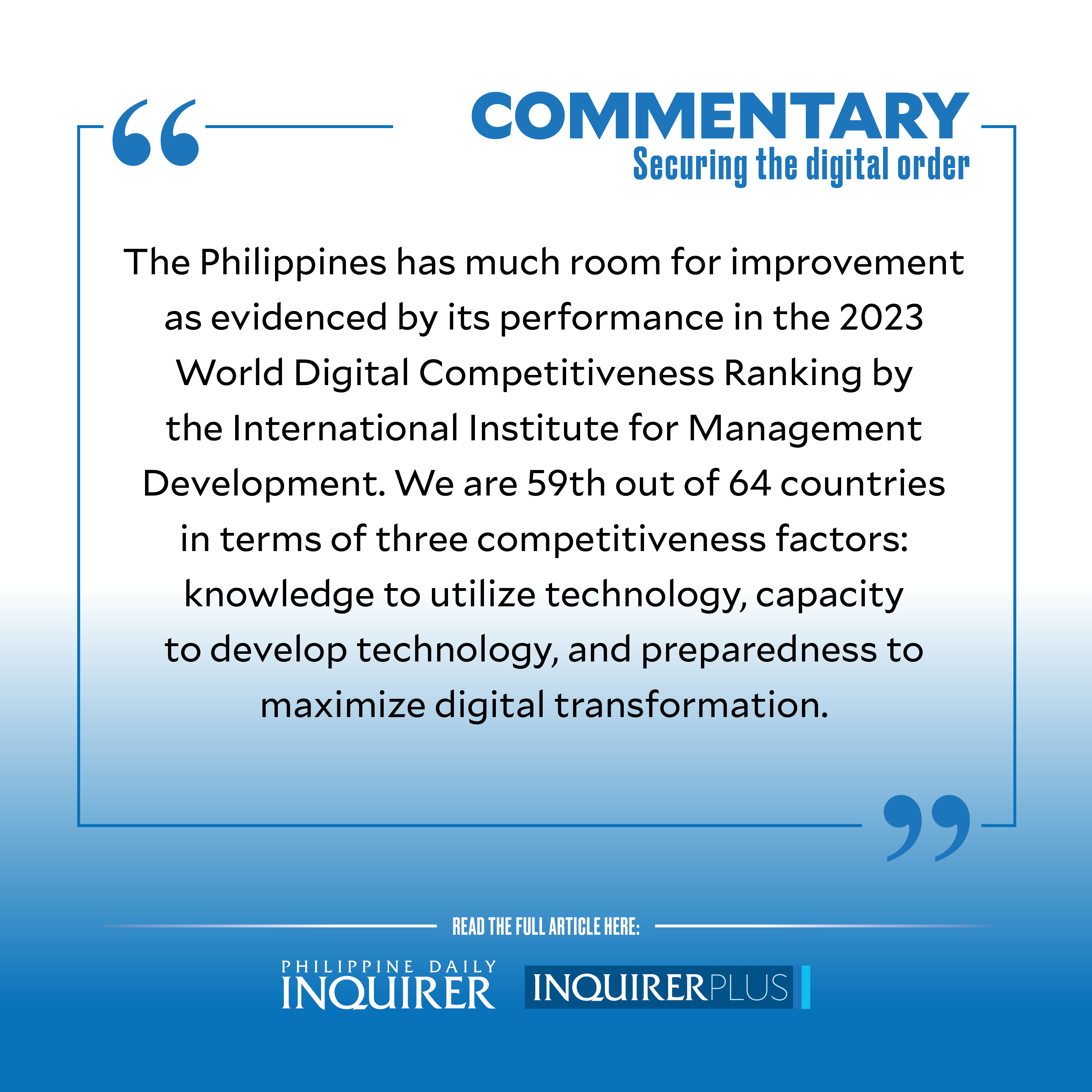
Technology is humankind’s ally. We only have to look at the possibilities created by innovation, things that we never dreamed could happen or could be done decades ago.
Left unchecked, however, technology could also be a threat. If it falls into the wrong hands, then the lofty goals that drive innovation would become tools by which people are taken advantage of, endangered, and defrauded. Societies could be paralyzed and the usual activities that power a nation can grind to a halt.
In these precarious times, the Philippines, which sits at the heart of the Indo-Pacific region, is facing many threats to its territorial and sovereign integrity, its economic security, and yes, its digital space. As the new year begins, we expect these threats to intensify and be more felt in people’s daily lives.
In the West Philippine Sea, the threats we face are in the form of expansionist activities of a wayward giant neighbor. We need the support of countries that believe in upholding the rules-based international order and common decency in international conduct in this asymmetric, multipolar world. On the economic front, we are concerned with achieving economic security, where Filipinos are consistently able to meet their basic needs. We are doing our best to create a business regulatory environment that is conducive to investments as we pivot to an investment-led growth that would have a multiplier effect and eventually narrow the income gap and uplift the lives of more people. In both these aspects, we bank on the close cooperation among the government, the private sector, and civil society, with help and guidance from like-minded partners in the international community.
But there is another realm, another order that needs to be preserved. I go back to the possibilities brought by technological developments. These things have enabled us to accomplish tasks faster and more efficiently and to conduct business while not necessarily confined to a physical office, or manage large-scale industry operations with mere keystrokes. They have allowed us to remain connected to our families and friends, and on a larger scale, to other organizations, industries, or nations. Unfortunately, malicious minds and sophisticated criminals are exploiting technology to further their own ends—for their personal material gain, to influence the way people think, and to make others do their twisted bidding.
This latter threat is invisible and thus stealthier, more sinister.
In the meantime, the Philippines has much room for improvement as evidenced by its performance in the 2023 World Digital Competitiveness Ranking by the International Institute for Management Development. We are 59th out of 64 countries in terms of three competitiveness factors: knowledge to utilize technology, capacity to develop technology, and preparedness to maximize digital transformation.
No less than President Marcos has declared that digital transformation is one of the priorities of his administration. However, there is no genuine digital transformation if we cannot secure our digital sphere and if our people live in perpetual threat, unable to defend themselves or even acknowledge that the internet could be a very dangerous place.
We at the institute continue to call for closer collaboration among the government, the private sector, and civil society in securing not only our physical territory and the economic well-being of our people, but the digital space in which we live as well, especially since we are aiming for economic growth that is investment-led, inclusive, sustainable, and technology-driven. Part of resilience is cyber-resilience, and the Philippines must increase its ability to detect, manage, respond to, and prevent cyberattacks to fully reap the benefits of technology.
I look forward, then, to our two-day conference entitled “Fortifying Cyber Cooperation Towards Digital Security” which will be held on Jan. 16-17 in partnership with the Embassy of Canada in the Philippines. We are honored by the participation of Defense Secretary Gilbert Teodoro who will deliver the keynote speech on the first day and Budget Secretary Amenah Pangandaman keynoting the second day of discussions.
We will learn from the expertise of our speakers who will share their insights on how best we can be a cyber-resilient economy and achieve security in all spheres, including our digital spaces.
Ultimately, achieving a digitally transformed and competitive Philippines necessitates a whole-of-society approach. Let us all learn to keep each other secure in cyberspace for our common benefit.
—————
Dindo Manhit is founder and CEO of the Stratbase Group.

